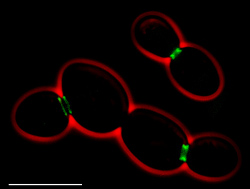 |
linkurl:Philippsen Lab, Biozentrum Basel;http://commons.wikimedia.org/wiki/File:S_cerevisiae_septins.jpg |
**__Related stories:__***linkurl:Cheating yeast help group;http://www.the-scientist.com/news/display/57687/
[14th September 2010] *linkurl:Video: Transcription, live;http://www.the-scientist.com/blog/display/57561/
[18th July 2010] *linkurl:Yeast: angiogenesis model? Yup;http://www.the-scientist.com/blog/display/57252/
[23rd March 2010]


















